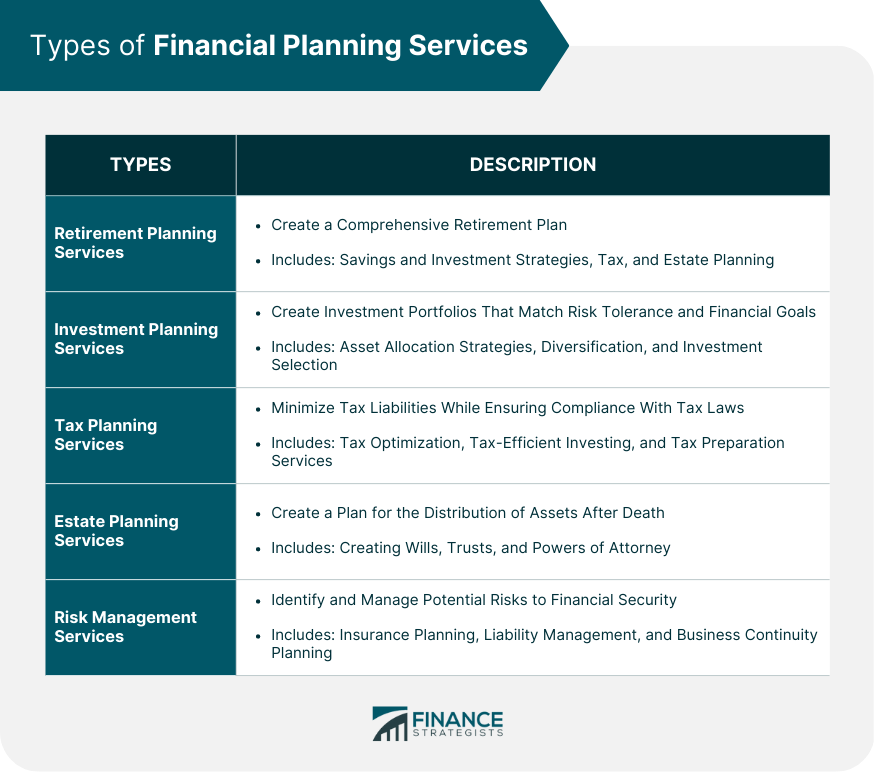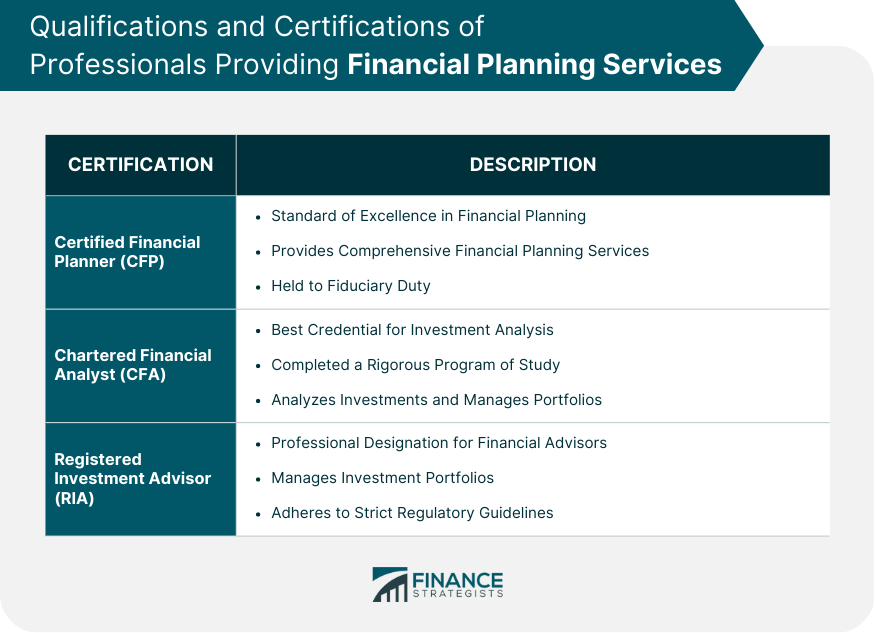Financial planning services refer to professional services that help individuals and businesses manage their finances and plan for their financial future. They are provided by qualified and experienced financial planners who have expertise in investment management, retirement planning, tax planning, estate planning, and risk management, among other areas. The primary aim of financial planning is to help clients achieve their financial goals by creating a comprehensive financial plan that considers their current financial situation, future financial goals, and potential risks. Financial planning services benefit anyone who wants to achieve financial security and success. Individuals planning for retirement, saving for a large purchase, or creating a budget can benefit from financial planning services. Businesses looking to manage their cash flow, invest their profits, or create a financial plan for growth can also benefit from financial planning services. Additionally, individuals or businesses looking for help with tax planning, estate planning, or risk management can benefit from financial planning services. Essentially, anyone who needs help with their financial goals and wants to work with a professional can benefit from financial planning services. Financial planning services include several types of services, each tailored to meet specific needs. Some of the most common types of financial planning services are: Retirement planning services help individuals plan for their retirement by creating a comprehensive plan that includes savings and investment strategies, tax, and estate planning. A retirement plan will ensure that individuals have enough savings to maintain their standard of living after they retire. Investment planning services help individuals and businesses create investment portfolios that match their risk tolerance and financial goals. An investment plan includes asset allocation strategies, diversification, and investment selection. Tax planning services help individuals and businesses to minimize their tax liabilities while ensuring compliance with tax laws. Such services include tax optimization, tax-efficient investing, and tax preparation services. Estate planning services help individuals and businesses create a plan for the distribution of their assets after death. These include creating wills, trusts, and powers of attorney, among other things. Risk management services help individuals and businesses identify and manage potential risks to their financial security. These include insurance planning, liability management, and business continuity planning. Each type of financial planning service addresses specific financial needs and goals. Clients can choose the type of financial planning service best suits their unique financial situation and goals. A comprehensive financial plan may include one or more types of financial planning services, depending on the client's financial situation and goals. Financial planning services offer several benefits to individuals and businesses. Some of the most significant benefits are: One of the primary benefits of financial planning services is that they help individuals and businesses create a clear financial roadmap that outlines specific financial goals and the steps needed to achieve them. A financial roadmap provides clarity and direction, making it easier to make informed financial decisions. Financial planning services help individuals and businesses identify and manage potential risks to their financial security. By identifying potential risks, financial planners can create strategies to minimize or mitigate these risks. This can include creating an emergency fund, purchasing insurance, or diversifying investments. Investment planning services help individuals and businesses to create investment portfolios that match their financial goals and risk tolerance. Financial planners can help individuals and businesses maximize their investment returns by selecting appropriate investments and asset allocation strategies. Financial planning services help individuals and businesses to set and achieve specific financial goals, such as saving for retirement, paying off debt, or purchasing a home. By creating a clear financial roadmap, financial planners can help individuals and businesses to achieve these goals more efficiently. Tax planning services help individuals and businesses to minimize their tax liabilities while ensuring compliance with tax laws. Financial planners can help individuals and businesses maximize their tax benefits by optimizing tax deductions and credits. Financial planning services provide individuals and businesses with the tools and strategies they need to achieve their financial goals while minimizing risks and maximizing returns. Whether retirement, investment, tax, estate, or risk management, financial planning services can help clients achieve financial security and success. Choosing a qualified financial planner is essential to achieving one's financial goals. Financial planners can obtain several qualifications and certifications to demonstrate their expertise and professionalism. Some of the most common qualifications and certifications are: Certified Financial Planner certification is awarded by the Certified Financial Planner Board of Standards, Inc. The CFP certification is recognized as the standard of excellence in the financial planning profession and is awarded to individuals who have met rigorous education, examination, and ethical requirements. CFPs are trained to provide comprehensive financial planning services, including investment management, retirement planning, estate planning, and tax planning. CFPs are held to a fiduciary duty, which requires them to always prioritize the interests of their clients over their own. For instance, they must recommend the best product for the client, even if it earns them less money than another product. The CFP Board outlines a CFP's fiduciary duty, stating that they must always act in the client's best interest when providing financial advice. In addition, the board identifies three duties that must be met by an advisor with a fiduciary duty: loyalty, care, and following client instructions. Chartered Financial Analyst certification is awarded by the CFA Institute and is recognized as the gold standard in the investment management profession. The CFA certification is highly esteemed in the finance industry and is regarded as the best credential for investment analysis. It is granted by the CFA Institute, a non-profit professional organization comprising over 164,000 charter holders, portfolio managers, and other financial experts from 151 countries. The institute aims to enhance educational, ethical, and professional standards in the investment sector. CFA charter holders have completed a rigorous program of study in investment management, including economics, accounting, portfolio management, and ethics. CFA charter holders are trained to analyze investments, make informed investment decisions, and manage investment portfolios. A registered investment advisor is a professional designation awarded to financial professionals who are registered with the Securities and Exchange Commission (SEC) or state securities authorities. RIAs are fiduciaries, meaning they are required to act in the best interests of their clients. They provide advice and management of investment portfolios for clients and must adhere to strict regulatory guidelines. RIAs are required to pass the Series 65 exam and register with either the SEC or state authorities based on the amount of money they manage. They have to file a Form ADV and disclose documents to all clients. Compensation for RIAs is typically based on a percentage of assets under management. They are obligated to act in a fiduciary capacity for their clients at all times, as per legal requirements. When it comes to choosing a financial planning service provider, there are several factors to consider: Researching Potential Providers. Take the time to research potential providers by reading their websites, checking their credentials, and reading reviews from previous clients. Look for providers who specialize in your specific financial needs. Evaluating Credentials and Experience. Make sure the provider has the appropriate credentials and experience in the areas you need help with. Consider certifications such as Certified Financial Planner, Chartered Financial Analyst, and Registered Investment Advisor. Asking for Referrals. Ask for referrals from friends, family, or colleagues who have previously used financial planning services. This can help you find a provider with a track record of success. Understanding Fees and Costs. Make sure you understand the fees and costs associated with financial planning services. Ask about hidden fees, and ensure you know how the provider is compensated – fee-only, commission-based, or a combination of both. By taking the time to research and evaluate potential providers, asking for referrals, and understanding the fees and costs, you can find a financial planning service provider who can help you achieve your financial goals. Financial planning services offer numerous benefits to individuals and businesses who want to achieve financial security and success. They help create a clear financial roadmap, minimize financial risks, optimize investment returns, achieve financial goals, and maximize tax benefits. Additionally, by obtaining qualifications and certifications, financial planners demonstrate their expertise and professionalism in providing comprehensive financial planning services. When choosing a financial planning service provider, it is essential to research and evaluate potential providers, ask for referrals, and understand fees and costs. By doing so, individuals and businesses can find a financial planning service provider to help them achieve their financial goals. Take the first step towards securing your financial future by hiring a financial advisor to help you create a comprehensive financial plan tailored to your unique financial situation and goals.What Are Financial Planning Services?
Who Benefits From Financial Planning Services
Types of Financial Planning Services
Retirement Planning Services
Investment Planning Services
Tax Planning Services
Estate Planning Services
Risk Management Services

Benefits of Financial Planning Services
Creating a Clear Financial Roadmap
Minimizing Financial Risks
Optimizing Investment Returns
Achieving Financial Goals
Maximizing Tax Benefits
Qualifications and Certifications of Professional Providing Financial Services
Certified Financial Planner (CFP)
Chartered Financial Analyst (CFA)
Registered Investment Advisor (RIA)

Choosing a Financial Planning Service Provider
Final Thoughts
Financial Planning Services FAQs
Financial planning services refer to professional services that help individuals and businesses manage their finances and plan for their financial future. These services include investment management, retirement planning, tax planning, estate planning, and risk management, among other areas.
Anyone who wants to achieve financial security and success can benefit from financial planning services. Individuals planning for retirement, saving for a large purchase, or creating a budget, and businesses looking to manage their cash flow, invest their profits, or create a financial plan for growth can benefit from financial planning services.
The types of financial planning services include retirement planning services, investment planning services, tax planning services, estate planning services, and risk management services. Each type of service addresses specific financial needs and goals.
Financial planning services offer several benefits, including creating a clear financial roadmap, minimizing financial risks, optimizing investment returns, achieving financial goals, and maximizing tax benefits.
When choosing a financial planner, look for qualifications and certifications such as Certified Financial Planner (CFP), Chartered Financial Analyst (CFA), and Registered Investment Advisor (RIA). These certifications demonstrate the financial planner's expertise and professionalism in providing comprehensive financial planning services.
True Tamplin is a published author, public speaker, CEO of UpDigital, and founder of Finance Strategists.
True is a Certified Educator in Personal Finance (CEPF®), author of The Handy Financial Ratios Guide, a member of the Society for Advancing Business Editing and Writing, contributes to his financial education site, Finance Strategists, and has spoken to various financial communities such as the CFA Institute, as well as university students like his Alma mater, Biola University, where he received a bachelor of science in business and data analytics.
To learn more about True, visit his personal website or view his author profiles on Amazon, Nasdaq and Forbes.











